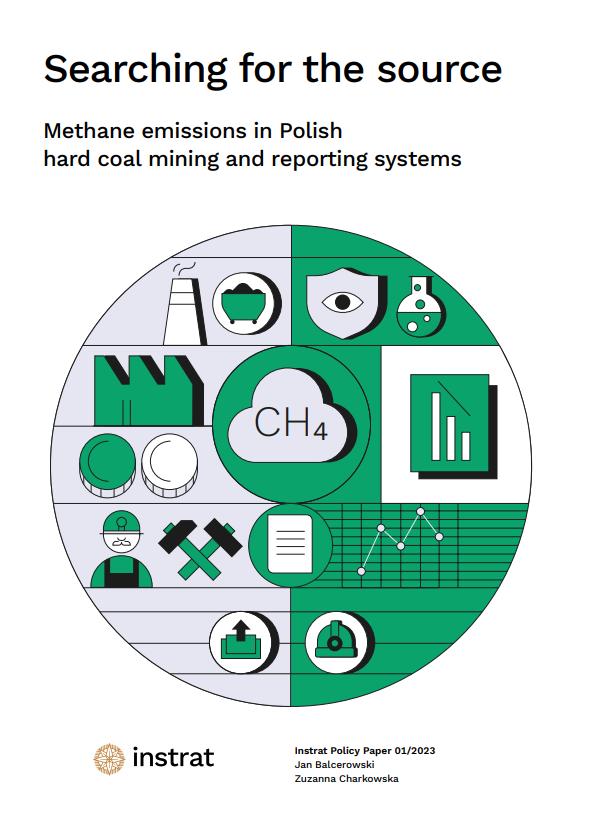Methane is the second most harmful greenhouse gas after CO2. Its emissions from Polish hard coal mines are a significant contributor to the scale of the EU emissions as a whole, while Poland vowed under the Global Methane Pledge to reduce its emissions by 30 percent by 2030. Upcoming EU regulations are expected to require the Polish mining industry to make more progress than it has so far, but their effective implementation requires reforms in the reporting system, according to Instrat experts.
Harmful methane
The IPCC recommends reducing methane emissions as one of the best ways to combat global warming in the coming years – says Michał Hetmański, CEO of Instrat, Warsaw-based think tank. Methane (CH4) emissions are not only a factor in global warming, but also negatively affect our health. They increase air pollution and cause respiratory diseases.
Poland is an exception on the European methane emissions map because of the unusual structure of the emissions themselves. 90% of Poland’s industrial methane emissions come from hard coal mining – a much higher figure compared to the EU as a whole, where extraction of all fossil fuels make up for 38% – according to Michał Hetmański.
More than 420 thousand tons of methane were emitted by Polish coal mines in 2021 – a drop of 3 percent y/y, but as much as 28 percent more than a decade ago. This decline, however, is not the result of a deliberate government policy to reduce methane emissions, but the end of mining the most emission-intensive coal seams. The structure of unit-level methane emissions from Poland’s hard coal mines presents as follows:
EU regulations to introduce new obligations and penalties
Over the last decades, the social and environmental costs of methane emissions have not been reflected in either Poland’s environmental fee system or the EU ETS emissions pricing mechanism. – The EU proposal introduces new, stricter rules for reporting emissions. Mining companies will be obliged to inform the respective authorities in detail about total emissions coming from ventilation and drainage stations – Hetmański explains. Ultimately, flaring (releasing gas into the atmosphere without its combustion) is to be banned. The reporting standard will also be raised.
Reforms in the mining industry and new higher emission fees much needed
The implementation of the EU regulation on reducing methane emissions is going to be hampered on the ground in Poland if the government does not do enough, which has been the case so far – especially in the area of reforming the system of reporting. Michał Hetmański warns: The coal mining industry and the policy makers must realize that the 2-3 largest coal producers are responsible for Poland’s significant contribution to EU methane emissions. Mining companies argue that investments in technologies to reduce emissions are by no means viable but they are only partly right. The increased cost of methane emissions should be the main policy instrument to encourage those investments in abatement technologies – expert says.
Instrat recommends raising the environmental fee according to the polluter pays principle, which currently stands at just EUR 0.07 (PLN 0.34) per ton of methane and has barely been updated for years. This is well below what the Inflation Reduction Act is going to introduce very soon in the US. A very ambitious methane pricing system will go into effect there in the next few years – the corresponding fee is expected to range from initially USD 900 per ton to as much as USD 1’500. What the Polish hard coal mining industry needs from the government is a similar roadmap and guidance, connected with funding. Think tank warns that national policy makers chose to stand on the side of polluters.
Experts argue also that it is necessary to reform and increase reporting standards by mining companies. The whole point of the international climate action against methane and establishment of the International Methane Emissions Observatory is that current reporting requirements are not bulletproof against leaks or mistakes in reporting. Instrat believes strengthening the mandate of the respective national oversight authorities is urgently needed to make sure EU methane regulation is implemented. The government should additionally oblige polluters to regularly publish data on unit emissions from individual mines.
Contact
Michał Hetmański, CEO of Instrat Foundation, michal.hetmanski@instrat.pl +48 513 748 019


